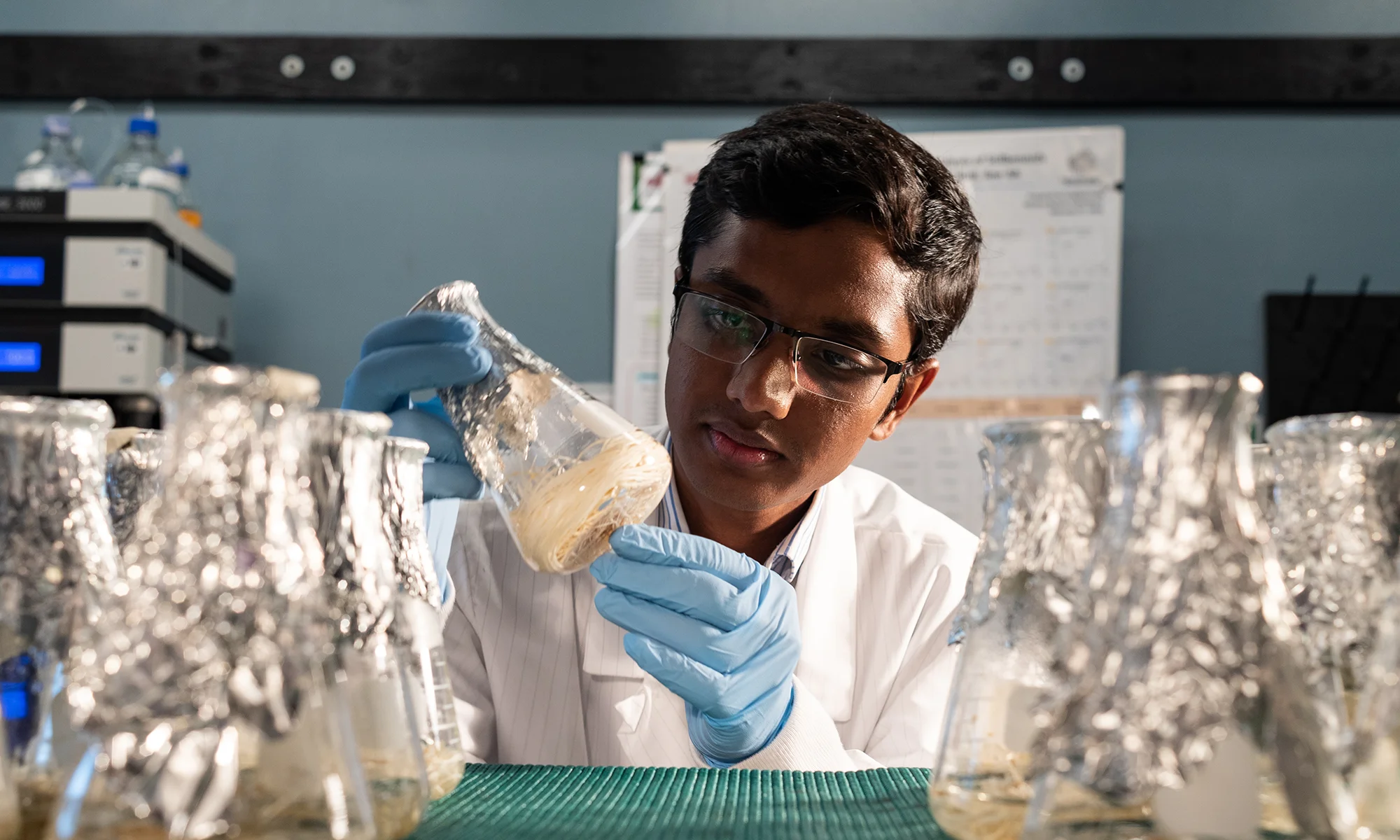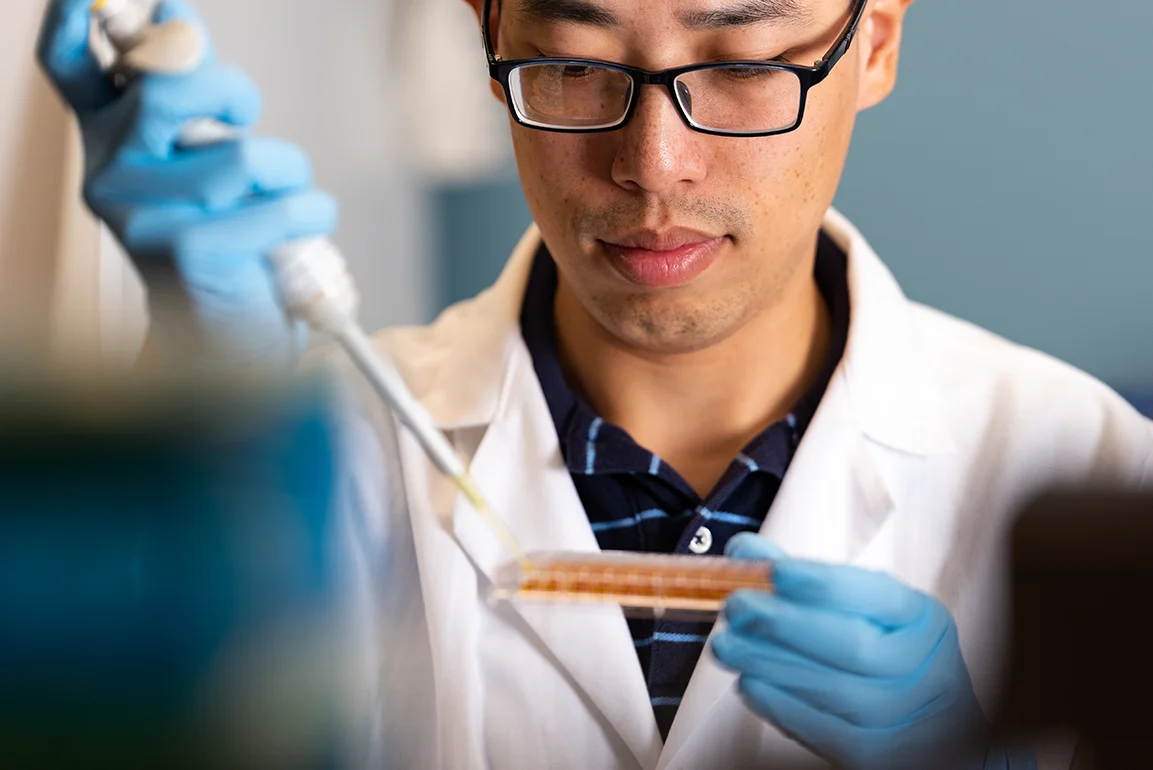MS in Molecular Biosciences

Turn discovery into impact with an M.S. in Molecular Biosciences at A-State. This program offers a broad curriculum spanning biotechnology, cell biology, computational biology, immunology, food safety, and more. As a graduate student, you'll engage in research across genomic, proteomic, cellular, and organ-level systems. You'll be equipped to translate discovery into meaningful solutions that serve society in medicine, agriculture, environmental science, and beyond.

Degree Overview
Master of Science in Molecular Biosciences
Our program is built on a foundation of interdisciplinary science, cutting-edge technology, and hands-on innovation. You'll have access to on-campus facilities, including a greenhouse, growth chambers, a cell culture lab, advanced imaging suites, and an animal facility. These tools empower you to turn your questions into real discoveries. Additionally, with faculty involved in both research and entrepreneurial ventures, you'll gain exposure to the business side of science through their direct mentorship.
Cost
Tuition & FeesAdmission Requirements
- Baccalaureate Degree with a 2.75 GPA
- or 3.0 over last 60 hours
- Completed Online Application
-
Application Fee: $30
- Official Transcripts
- Meeting the minimum requirements for admission to the Graduate School does not necessarily equal acceptance into a particular graduate program.
Careers & outcomes
What can I do with a Molecular Biosciences degree?
From advancing medical research to improving food safety, you'll graduate ready to make a meaningful impact. Explore careers as a:
- Molecular Biologist
- Biotechnologist
- Biochemist
- Microbiologist
- Research Scientist

Connect With Us.
Program Requirements
UNCONDITIONAL ADMISSION STATUS
View University Graduate Degree Policies
The following Graduate School admission requirements are minimum standards which identify the pool of applicants from which departments select students to be admitted in a degree program. To be granted unconditional admission status in the Graduate School, applicants must:
- Submit a completed online application for admission and the nonrefundable application fee of $30 for U.S. Applicants, $40 for International Applicants, or $50 for Doctoral Applicants to Graduate School Admissions, along with the required program documents, by the deadline on the department website.
- Earned a baccalaureate degree from an accredited institution (or its equivalent as determined by the Graduate School).
- Achieved a minimum cumulative undergraduate grade point average of 2.75 on a 4.00 scale or a 3.00 GPA on the last 60 hours.
- Achieved a minimum 3.00 GPA on any previous graduate courses completed at either Arkansas State University or another accredited university.
- Submitted official transcripts from each college or university as requested by the Graduate School. Official transcripts must be submitted directly from the registrar of other institutions to the office of the Graduate School at Arkansas State University.
CONDITIONAL ADMISSION STATUS
An applicant who fails to meet the GPA requirements for Unconditional Admission Status, who lacks the appropriate undergraduate background for a particular degree program, or whose baccalaureate degree is from an unaccredited institution, may be granted conditional admission status after:
- Submission of a completed online application for admission and the designated nonrefundable application fee mentioned above to Graduate School Admissions, along with the required program documents, by the deadline on the department website.
- Submitted official transcripts from each college or university as requested by the Graduate School. Official transcripts must be submitted directly from the registrar of other institutions to the office of the Graduate School at Arkansas State University.
- Achieving a minimum cumulative undergraduate grade point average of 2.50 on a 4.00 scale or a 2.75 GPA on the last 60 hours for admission into a graduate program or for admission as a non-degree student.
PROGRAM ADMISSION CRITERIA
Meeting the minimum requirements for admission to the Graduate School does not necessarily ensure acceptance into a particular graduate degree program. Individual departments may establish requirements for individual degree programs above and beyond the standards for admission to the Graduate School.
M.S. in Molecular Biosciences Admission Requirements
Students seeking admission into the Master of Science in Molecular Biosciences Program must meet the admission requirements of both Graduate Admissions and the program's specific requirements. These include:
- Applicant must have a minimum of a B.S. in basic or applied science.
- A $30 nonrefundable application fee for the M.S. program.
- This can be paid online as part of the application or a check can be mailed to the A-State Treasurer’s Office with the applicant’s name and date of birth in the memo line. Checks must be made payable to Arkansas State University. If applications are received without payment, Graduate Admissions will hold all application materials and notify the applicants that no action will be taken until payment is received. International students may utilize a check or an International Postal Money Order to remit payment in U.S. currency.
- Graduate Record Examination (GRE) scores for the Verbal, Analytical, and Quantitative
tests. Minimum scores are as follows:
- Verbal: 150
- Quantitative: 150
- OR a combined score of 1000 for both sections for scores that used the old scoring system.
- Although not required, scores from an advanced test related to Molecular Biosciences may increase a candidate’s chance for admission.
- International student applicants must demonstrate a satisfactory level of proficiency
in the English language if English is not their native language.
- Applicants must submit a score of 213 (computer-based) on the Test of English as a Foreign Language, OR
- Must satisfactorily complete advanced level II of the university's Center for English as a Second Language program.
- Some MBS courses have prerequisites which must be met in order to succeed in these
classes.
- These courses may include general and organic chemistry, biochemistry, introductory biological science, and cell biology.
- Based on previous undergraduate coursework, students may be required to pass one or more of these prerequisite courses before attempting graduate level study in this field.
- Submit one copy of official transcripts of all previous undergraduate and graduate
coursework attempted.
- These must be sent directly from the institution(s) previously attended.
- Graduate Admissions will compute the graduate GPA by counting all graduate courses completed, including any repeated courses.
- Submit three letters of recommendation to be reviewed by the program committee.
- Submit a current Curriculum Vitae.
- Submit a personal statement (maximum of two pages).
- Describe your academic and research goals. You are encouraged to identify areas of research interest, as well as possible research mentors within the faculty of the Molecular Biosciences Program.
1. SUBMISSION OF APPLICATION MATERIALS
Closely observe the deadline and required materials set by your graduate program of interest, including any additional documents requested of students who are seeking departmental funding through assistantships or fellowships. Complete the application and fax, e-mail or mail any materials that could not be submitted online to A-State Graduate Admissions.
General documents needed in the application process:
- A completed online application accompanied by the appropriate application fee ($30 for U.S. applicants, $50 for International applicants, $50 for Doctoral applicants), along with the required documents for that specific graduate program. See the program website for specific required documents. (There may be separate application forms for some programs, as noted on the departments' websites.)
- Official transcripts from all colleges and universities attended since leaving high school. Transcripts must be mailed directly from the institutions previously attended. If you are a graduate of A-State, we will obtain your transcript for you.
- All students are required to present written documentation of measles, mumps, and rubella (MMR) immunization. This immunization must have been received after the first birthday and after January 1, 1968.
- Arkansas law requires that, in order to be eligible for enrollment at a public institution of higher learning, a male applicant between the ages of 18 and 25 who is a U.S. citizen must be registered or be exempt from registration with the Selective Service System.
- If a standardized test is required for your major, you may contact the Testing Center at Arkansas State University at (870) 972-2038 for information regarding tests and test dates.
2. REVIEW BY THE ACADEMIC PROGRAM
Once an applicant has submitted all required documents to Graduate Admissions, the admissions committee for that particular academic program will review their applicant file and make their decisions regarding admission.
3. FINAL REVIEW BY THE GRADUATE SCHOOL
Once the Graduate School receives the academic program’s admission decision, they email a copy of that Notice of Admission Decision to the applicant, unless the program notifies their applicants directly.
4. ADMISSION
If accepted into the degree program to which you applied, Graduate Admissions will admit you to the University and email you a copy of your Notice of Admission, unless that program notifies their accepted applicants directly. Admitted applicants need to check with their assigned advisor, as noted on their Notice of Admission, in order to be able to register for the semester.

